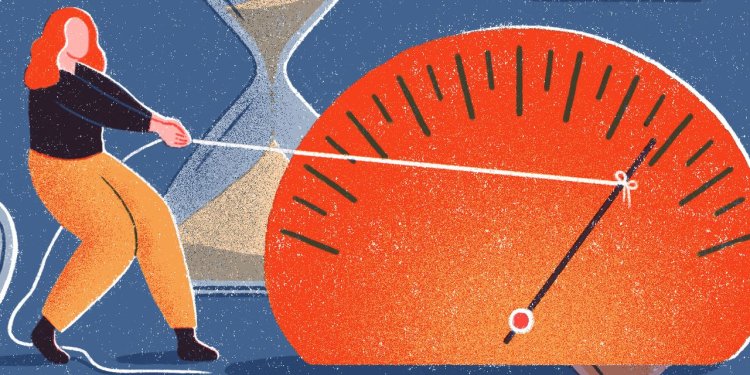Weight Loss Really Is Harder for Women in Midlife
Illustration: Jessie Lin By Sumathi Reddy May 2, 2023 10:00 am ET When women in midlife struggling with their weight come to see Sylvia Gonsahn-Bollie in her Silver Spring, Md., doctor’s office she tells them the truth: “It’s not all in your head.” The good news, which is kind of bad news, for midlife women trying to manage their weight is that the challenges are real. Newsletter Sign-Up Health Get a weekly briefing on what's new in health, medicine, personal well-being and the business of healthcare. Subscribe Now For both men and women, weight pea


Illustration: Jessie Lin
When women in midlife struggling with their weight come to see Sylvia Gonsahn-Bollie in her Silver Spring, Md., doctor’s office she tells them the truth: “It’s not all in your head.”
The good news, which is kind of bad news, for midlife women trying to manage their weight is that the challenges are real.
Newsletter Sign-Up
Health
Get a weekly briefing on what's new in health, medicine, personal well-being and the business of healthcare.
Subscribe NowFor both men and women, weight peaks between ages 40 and 65 as they lose muscle mass and metabolism slows down. But for women, hormonal changes linked to the midlife menopause transition make things worse, say doctors and researchers who study menopause. Hormone therapy along with strength training and dietary changes can help.
Many women in their 40s and 50s notice that their weight starts to creep up, even if their routines stay the same, and that it gets harder to lose weight, researchers say. Starting in midlife, women on average gain between 0.8 and 1.5 pounds a year, says Daniela Hurtado, an obesity-medicine physician and assistant professor of medicine at Mayo Clinic in Jacksonville, Fla., citing studies.
SHARE YOUR THOUGHTS
Has your relationship to weight management changed as you’ve aged? If so, how? Join the conversation below.
The hormone changes during the menopause transition—which typically starts in your 40s when your menstrual cycle becomes irregular—are associated with an average weight gain of about 6 pounds, says Kathleen Jordan, chief medical officer of Midi Health, a virtual-care clinic for women over 40.
A major culprit is the decline in estrogen that happens with menopause, say doctors and researchers. The decrease is linked to changes in the way women’s bodies distribute fat, with more accumulating in the abdominal region, rather than in the thighs and hips. Weight gain in this central area is linked to worse health outcomes than weight accumulation in other parts of the body.
Dropping estrogen levels are also associated with decreased insulin sensitivity and higher cholesterol levels, which can make it more difficult for women to maintain or achieve a healthy weight and put them more at-risk for developing Type 2 diabetes, says Dr. Jordan.
Studies have pointed to the importance of estrogen in managing weight. One study focusing on women over age 40 found that women who took medication to stop their ovaries from producing estrogen for 24 weeks gained more than 3 pounds of fat.

Dr. Wendy Kohrt
Photo: Dr. Wendy Kohrt
Some research has suggested that estrogen may influence your motivation to exercise. One study found that women with estrogen did more vigorous and regular physical activity than those who took medication to suppress estrogen.
“This at least suggests that there might be a biological driver [behind women’s midlife weight gain] and it’s not just what you choose to do,” says Wendy Kohrt, a professor of medicine at the University of Colorado Anschutz Medical Campus in Aurora, who was senior researcher on both studies.
The estrogen decline compounds the loss of muscle mass that happens for both men and women as they age. We burn calories in our muscles, so as we lose muscle we burn fewer calories both at rest and when active, says Ekta Kapoor, an associate professor of medicine at Mayo Clinic in Rochester, Minn., who specializes in endocrinology.
The changes in women’s metabolism and bodies during the menopause transition also put them more at risk for complications such as elevated blood pressure and cholesterol.
A November study in the journal EBioMedicine funded by the health-science company Zoe studied more than 600 women after a high-fat, high-carbohydrate meal and for a further two weeks. Perimenopausal and postmenopausal women had worse metabolic health than premenopausal women, including higher cholesterol and blood pressure levels, higher glucose and insulin resistance levels, and more inflammation.
Even among women who were the same age, women who were premenopausal had some better health outcomes—such as glucose levels—than those who were in perimenopause or beyond, says Sarah Berry, an associate professor in the department of nutritional sciences at King’s College London, who was senior author of the study.
For women battling midlife weight gain, doctors say that menopausal hormone therapy—a form of estrogen often taken with progesterone that’s approved for treating common symptoms such as hot flashes—can help in some ways. There’s some evidence that it can help reverse some of the fat redistribution to the abdomen that occurs during menopause.
Hormone therapy can also alleviate symptoms such as sleep problems and mood issues that can indirectly contribute to weight gain.
However, hormone therapy alone won’t stave off midlife weight gain. Doctors say women also need to stay active and add strength training to their workouts. Lifting weights and other forms of resistance training helps combat the loss of muscle mass.
“A lot of us, we love cardio but you want to try to at least get 50% cardio and 50% resistance,” says Dr. Gonsahn-Bollie.

Dr. Sylvia Gonsahn-Bollie
Photo: Jason Weil
To fight abdominal-area weight accumulation, high-intensity interval training, or HIIT, is useful. To lose weight and keep it off, you should aim for at least 150 minutes of exercise a week, but most people need closer to 300 to 420 minutes, says Dr. Gonsahn-Bollie.
Dietary changes can help too. Add protein and reduce sugar, doctors say. Eating more fiber will help cholesterol levels, as well as slow the digestion of food, says Dr. Jordan, which can make you feel more full. An easy way to increase fiber in your diet is to add a few spoonfuls of chia or flax seeds to yogurt or cereal, she says.
Managing stress is also an important part of weight management, says Dr. Gonsahn-Bollie. Chronic stress elevates cortisol hormones, which can increase insulin resistance and make it harder to lose weight.
If you’re under age 40, try to enter perimenopause at a healthy weight, which your doctor can help you determine, advises Dr. Kapoor. And for those women trying to lose weight during the transition, set realistic expectations. Losing weight really isn’t easy at this time.
“Celebrate every pound that you did not gain,” she says.
Write to Sumathi Reddy at [email protected]
What's Your Reaction?

















